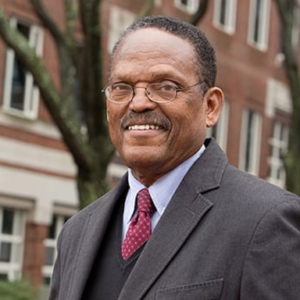William Julius Wilson is Lewis P. and Linda L. Geyser University Professor Emeritus at Harvard University. He is also director of the Joblessness and Urban Poverty Research Program at Harvard’s Malcolm Wiener Center for Social Policy.
After receiving his Ph.D. from Washington State University in 1966, Professor Wilson taught sociology at the University of Massachusetts at Amherst, before joining the University of Chicago faculty in 1972. In 1990 he was appointed the Lucy Flower University Professor and director of the University of Chicago’s Center for the Study of Urban Inequality. He joined the faculty at Harvard in July 1996.
Past President of the American Sociological Association, Wilson has received 46 honorary degrees, including honorary doctorates from Yale, Princeton, Columbia, the University of Pennsylvania, Northwestern, Johns Hopkins, Dartmouth, and the University of Amsterdam in The Netherlands. A MacArthur Prize Fellow from 1987 to 1992, Wilson has been elected to the National Academy of Sciences, the American Academy of Arts and Sciences, the American Philosophical Society, the Institute of Medicine, the National Academy of Education, and the British Academy. He is a recipient of the 1998 National Medal of Science, the highest scientific honor bestowed in the United States, and was awarded the Talcott Parsons Prize in the Social Sciences by the American Academy of Arts and Sciences in 2003; the Daniel Patrick Moynihan Prize by the American Academy of Political and Social Science in 2013; the Robert and Helen Lynd Award for Distinguished Career Achievement by the Community and Urban Section of the American Sociological Association in 2013; and the W.E.B. Du Bois Career of Distinguished Scholarship Award by the American Sociological Association in 2014. A MacArthur Prize fellow, Professor Wilson has been elected to the National Academy of Sciences, The American Academy of Arts and Sciences, the National Academy of Education, and the American Philosophical Society. In June 1996 he was selected by Time magazine as one of America’s 25 Most Influential People.
Wilson is the author of numerous publications, including Power Racism and Privilege: Race Relations in Theoretical and Sociohistorical Perspectives (1973); The Declining Significance of Race (1978), winner of the American Sociological Association’s Sydney Spivack Award; The Truly Disadvantaged (1987), selected by the editors of The New York Times Book Review as one of the 16 best books of 1987 and recipient of The Washington Monthly Annual Book Award, the Society for the Study of Social Problems’ C. Wright Mills Award, and the American Political Science Association’s Aaron Wildavsky Enduring Contribution Award; When Work Disappears: The World of the New Urban Poor (1996), which was selected as one of the notable books of 1996 by the editors of The New York Times Book Review, and received the Sidney Hillman Foundation Award and the American Political Science Association’s Aaron Wildavsky Enduring Contribution Award; and The Bridge Over the Racial Divide: Rising Inequality and Coalition Politics (1999). More recently he is the co-author of There Goes the Neighborhood: Racial, Ethnic, and Class Tensions in Four Chicago Neighborhoods and Their Meaning for America (2006) and Good Kids in Bad Neighborhoods: Successful Development in Social Context (2006); and author of More than Just Race: Being Black and Poor in the Inner City (2009), which aims to change the thinking of problems of race and urban poverty in public policy.
Other honors granted to Wilson include the Seidman Award in Political Economy (the first and only non-economist to receive the Award); the Golden Plate Achievement Award; the Distinguished Alumnus Award, Washington State University; the American Sociological Association’s Dubois, Johnson, Frazier Award (for significant scholarship in the field of inter-group relations); the American Sociological Association’s Award for Public Understanding of Sociology; the Burton Gordon Feldman Award (“for outstanding contributions in the field of public policy”) from Brandeis University; the Martin Luther King, Jr. National Award (granted by the Southern Christian Leadership Conference, Los Angeles); the Diverse: Issues in Higher Education’s John Hope Franklin Award; Everett Mendelsohn Excellence in Mentoring Award, Harvard University; and the Anisfield-Wolf Book Award for Lifetime Achievement in Nonfiction. He was designated a Walter Channing Cabot Fellow at Harvard University for 2009-10, and in 2012, the Inequality, Poverty, and Mobility Section of the American Sociological Association renamed its Early Career Award as the William Julius Wilson Early Career Award.
Professor Wilson is a member of numerous national boards and commissions, and was previously the Chair of the Board of The Center for Advanced Study in the Behavioral Sciences and of the Russell Sage Foundation, and a member of the President Clinton’s Commission on White House Fellowships from 1994 to 2001.
Moynihan Lecture
Additional Content
Podcast interview with Wilson on the role of culture in poverty

